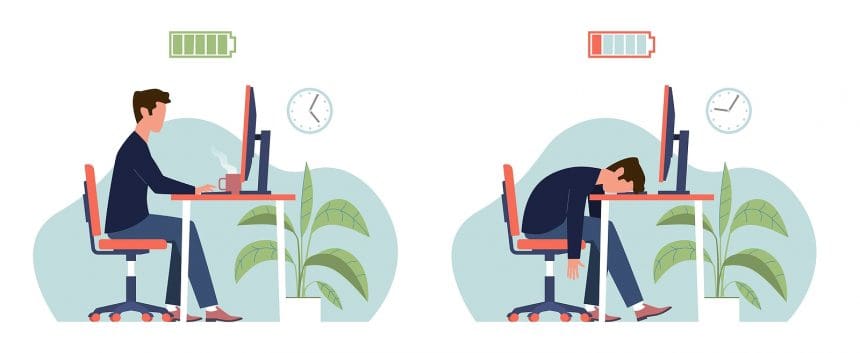
The first quarter of 2020 included many things for the world to adjust to—specifically one shift: work from home. And just when people thought it could be a temporary practice, it became more and more permanent throughout companies across the United States. With those transitions, remote work became the new normal. Leaders of companies were left with one question when pandemic restrictions loosened up: where are their employees more productive—in the office or at home?
There is plenty of data to back the fact that employees who can work from home are just as—or more—productive. The Becker Friedman Institute for Economics at the University of Chicago surveyed 10,000 employees, with results pointing to one key finding: people said they thought they were just as productive working from home compared to working in the office.
Remote work is not going away anytime soon. And while you may be getting more done at home, be sure you have a healthy relationship with work. Randy Simon, an expert on work-life balance told TODAY that a lot of setting yourself up for work-from-home success comes down to boundaries.
Here are some ways to avoid burnout in a remote world.
Create a designated workspace
If you have just started working remotely in the recent past, you may have noticed how convenient it is not having to leave your home but feel like you can never truly leave work because it is now within your home. If that’s the case, think about creating a designated space that’s solely for work. Once you set boundaries for your own space, you should feel like you can separate work and your personal life—physically and then eventually mentally.
Virtually connect with your coworkers
Just because you’re working remotely doesn’t mean you can’t connect on a virtual level with your coworkers. If you just talk with them during weekly meetings, consider reaching out to them to plan a happy hour or a designated time to talk about non-related work topics. While you can’t simply wander over to their desk, small talk and getting to know each other can still exist within your work life.
Allow short breaks for yourself
Have you ever worked remotely and found yourself staring at your screen too long—losing track of time? If you’d been used to taking breaks within the office at one point—or simply getting up to get water or go to get lunch, don’t let work from home deter you from still taking time for yourself. Plan breaks, even if they’re just 10 minutes long. A few breaks a day will help give your mind a rest so you can fully focus once you’re back at your desk.
“Breaks are crucial,” says Cal Newport, author of Deep Work: Rules for Focused Success in a Distracted World. “If you’re working day after day and not letting up, you will burn out.”
Put time on your calendar for these breaks if you need to, especially so your coworkers are aware of this special time carved out just for you.
Schedule time for your hobbies
You shouldn’t just schedule time for breaks—but also make sure you’re not overworking yourself, allowing room in your days or nights to practice a hobby. You are a human being after all, not a robot, and it’s normal to have interests outside of work.
“Without a daily commute, it’s easy to think that we will have so much added free time, but it’s easy to just add that time on to our workday,” shares writer and hobby advocate Betsy Ramser Jaime.
Turn on ambience videos
Working remotely means you’re not in an office and can control your own background noise. If you need extra help focusing and creating a calm work environment, check out YouTube’s different ambience videos—from a cozy cabin to a fall coffee shop to an enchanted forest. Ironically, creating a mood that makes you feel like you’re somewhere else can help you stay more present.
Take vacation (and sick) days seriously
Lastly, don’t forget to use your vacation and sick days when you need to. Just because you’re not traveling to and from an office doesn’t mean you don’t get to take time away from your job. In fact, it’s been scientifically proven that taking vacation days increases overall productivity and well-being. And if you don’t feel well but think you should keep working because you’re home, think again. Your sick days are provided to you for a reason. So use them and be kind to yourself about using them. It will help you maintain better boundaries with work, overall improving your work-life balance.









